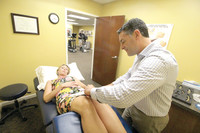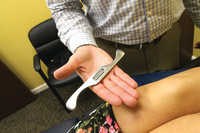It’s difficult to describe pain. I tried.
“It’s somewhere near there,” I said pushing my hand on my back below the belt line, “it’s constant, although it’s not as bad sometimes as …
This item is available in full to subscribers.
We have recently launched a new and improved website. To continue reading, you will need to either log into your subscriber account, or purchase a new subscription.
If you are a current print subscriber, you can set up a free website account by clicking here.
Otherwise, click here to view your options for subscribing.
Please log in to continue |
|


It’s difficult to describe pain. I tried.
“It’s somewhere near there,” I said pushing my hand on my back below the belt line, “it’s constant, although it’s not as bad sometimes as others.” I wasn’t describing what I felt, but rather where the pain was, and even that was tough. It’s not exactly like your body is a map and you can pinpoint a spot like you would name an intersection.
I’d been to see doctors and I’d been through the tests. I wasn’t convinced that I needed injections and if that didn’t work, surgery. I’d talked with my daughter, Diana, who is a physical therapist and I would have gone to see her if she wasn’t living more than 3,000 miles away.
Listening to me was Michael Nula of Elite Physical Therapy. That was at least two years ago.
On Thursday I was back at the office on Centerville Road, only this time I was asking the questions. Well, maybe not all of them. Michael wanted to know how I was feeling. I gave him an overview of my exercise routine and didn’t elaborate. I was here to get a story.
I wanted to hear how Elite evolved from a single physical therapist – that was Michael – into a company with nine locations in Rhode Island and 100 employees in 15 years.
What I learned was far more than the sacrifices Michael and his wife made to start the business. We talked about this extraordinary machine – the human body. Michael used the analogy of an automobile, observing that the years and activity add up like miles on the odometer. Like a car with many miles, things need attention and it doesn’t perform as it did fresh from the dealer’s showroom. Yet, he pointed out you can’t leave the car in the garage all the time either. That’s not an answer. It’s asking for trouble.
His advice seems simple enough: listen to your body and pay attention to that red light on the dashboard before you are confronted with a more serious problem.
“Respect how the machine works.”
To take the car metaphor a step further, is the physical therapist like an auto mechanic?
Michael called his job a mix of science and art. The science of knowing how the body works is critical to pinpointing the cause of that elusive thing we label as pain. The art is applying that knowledge to “tune up” the engine through a variety of therapies as well as altering our habits.
As the digital world has changed how we communicate, has Michael seen issues he can attribute to the use of cell phones and computers?
It’s a question that he’s thought about. Michael slumps in his chair, neck bent down as if typing on a laptop balanced on his knees. Then he lifts the imaginary computer to straighten his back. He doesn’t need to go into the details. I know what he is talking about.
That was one of the things Michael did for me. He visited the office, took one look at my cluttered desk and raised the screen with a couple of books.
And cell phones?
Michael bends his head over his cupped hands as if texting a message. He doesn’t need to say anything. It’s obviously not good posture. Technology is also making it easier for patients. Elite is using apps to help patients to perform stretches and exercises at home as well as addressing questions.
Michael, who grew up in Newport, left teaching to go into physical therapy. He has moved on from a full schedule of patients, although he still sees clients.
“When the player becomes the coach…that’s the kind of culture I want to create.”
Reaching that point has taken self-discovery and the realization that the success or failure of his enterprise depended on him. An axiom to success, says Michael, is “to surround yourself with great people.” On the top of his list of mentors he places his father, Robert, and his basketball coach from his high school years.
Back and neck pain are two of the most common complaints Michael encounters. His initial effort is aimed at releasing muscle spasms. From there the goal is to regain lost ranges of motion.
“We go to the root [of the problem] and work our way out.”
Michael uses a pyramid to illustrate where physical therapy fits in the scheme of addressing a condition. Physical therapy is at the base and the initial step toward a cure to be followed by medication, injections and finally surgery, which if it plays out as it should, would be needed by only a few.
Physical therapy has also evolved. Elite is using dry needling, the Graston technique and aqua therapy in addition to the conventional therapies of hands-on massage, heat, traction and exercises to limber the body and relieve pain.
Needling sounds painful, and I’m clueless as to what Graston is about.
Using members of his staff, I get a demonstration. The needles look to be no thicker than a hair. They are called “dry” since they are not used to inject a medication. They are inserted through the skin to reset the muscle reflex caused by sustained contraction of the muscle.
The patient in this case is training and development specialist Sarah Sullivan. PT and manager of the Warwick office, Kevin Costello, applies the needle after putting on gloves and using his thumbs to feel where it should be inserted. Sarah doesn’t flinch she says she doesn’t feel it. She’s teased not to fall asleep.
Michael demonstrates the Graston technique that uses a series to shaped stainless steel tools to relax muscles. Holding a curved Graston he massages Sarah’s knee.
Elite physical therapists work with the athletic departments at Brown, Providence College and URI. Their patients also include professional and top level amateur athletes.
Michael believes there may be room for Elite to grow with additional locations, but he doesn’t see selling the business to a regional or national corporation. He’s not looking to cash out. While his focus is on individual care, his goal is much broader.
“I want to see Rhode Island healthier…to pay forward,” he says.
Michael has come a long way from the day he sold his car, obtained a loan from his father and went without a paycheck for a year – he thanks his wife who brought home a paycheck for making it happen. A lot has changed in 15 years, but then Michael’s fundamental aim to help people live healthier, pain-free lives hasn’t.
I asked my daughter, Diana, what’s the secret to being a PT.
“The best tools are our very skilled eyes and hands,” she said. Knowing her and Michael, I would add compassion.
Comments
No comments on this item Please log in to comment by clicking here